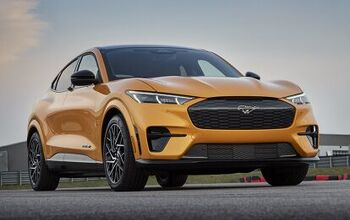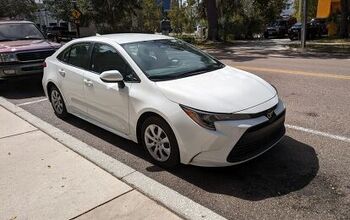Auto Industry Has Its Fingers Crossed for Trump's $1 Trillion Infrastructure Plan: Toyota Exec

As automakers dial back sales projections in a year that’s seen a rough start, the industry could be holding out hope for a legislative solution to lagging demand.
Toyota North America CEO Jim Lentz made this claim during the opening of the company’s expanded Ann Arbor research and design center on Thursday, adding that incentivizing new vehicles to draw down bulging inventories can’t continue forever. In his view, automakers are keeping extra vehicles on hand for a reason, not just because production hasn’t adjusted for slow sales.
Lentz, like other auto executives, is hoping for a sales bump in the event the Trump administration green-lights its proposed $1 trillion infrastructure plan.
The administration, which released its tax plan on April 26, is said to be readying a massive infrastucture plan — possibly fueled by an increase to the federal gas tax, which Trump has said he might support on the condition the money flows to highways. Details of the plan are coming “pretty soon,” Transportation Secretary Elaine Chao told CNBC on Monday.
Trump reportedly wants the proposal in front of Congress as soon as possible. According to Lentz, automakers want the same thing.
“If you get a $1 trillion stimulus, that could add 800,000 units,” Lentz said. “That’s one reason everyone is on the accelerator” trying to unload vehicles.
April auto sales in the U.S. fell nearly 5 percent, the fourth consecutive month of year-over-year declines. This follows a record year in which U.S. consumers snapped up 17.55 million new vehicles. For 2017, Lentz said he forecasts sales in the 17 to 17.2 million range.
While a boost to infrastructure spending could turn the tide on light-vehicles sales, Lentz knows automakers can’t keep up the current pace forever. Before long, manufacturers will be forced to decide “when is it prudent to lift off the accelerator,” he said, adding that the current level of incentives isn’t sustainable.
[Source: Reuters] [Image: Toyota Motor Corporation]

More by Steph Willems
Latest Car Reviews
Read moreLatest Product Reviews
Read moreRecent Comments
- Lichtronamo Watch as the non-us based automakers shift more production to Mexico in the future.
- 28-Cars-Later " Electrek recently dug around in Tesla’s online parts catalog and found that the windshield costs a whopping $1,900 to replace.To be fair, that’s around what a Mercedes S-Class or Rivian windshield costs, but the Tesla’s glass is unique because of its shape. It’s also worth noting that most insurance plans have glass replacement options that can make the repair a low- or zero-cost issue. "Now I understand why my insurance is so high despite no claims for years and about 7,500 annual miles between three cars.
- AMcA My theory is that that when the Big 3 gave away the store to the UAW in the last contract, there was a side deal in which the UAW promised to go after the non-organized transplant plants. Even the UAW understands that if the wage differential gets too high it's gonna kill the golden goose.
- MKizzy Why else does range matter? Because in the EV advocate's dream scenario of a post-ICE future, the average multi-car household will find itself with more EVs in their garages and driveways than places to plug them in or the capacity to charge then all at once without significant electrical upgrades. Unless each vehicle has enough range to allow for multiple days without plugging in, fighting over charging access in multi-EV households will be right up there with finances for causes of domestic strife.
- 28-Cars-Later WSJ blurb in Think or Swim:Workers at Volkswagen's Tennessee factory voted to join the United Auto Workers, marking a historic win for the 89- year-old union that is seeking to expand where it has struggled before, with foreign-owned factories in the South.The vote is a breakthrough for the UAW, whose membership has shrunk by about three-quarters since the 1970s, to less than 400,000 workers last year.UAW leaders have hitched their growth ambitions to organizing nonunion auto factories, many of which are in southern states where the Detroit-based labor group has failed several times and antiunion sentiment abounds."People are ready for change," said Kelcey Smith, 48, who has worked in the VW plant's paint shop for about a year, after leaving his job at an Amazon.com warehouse in town. "We look forward to making history and bringing change throughout the entire South." ...Start the clock on a Chattanooga shutdown.


































Comments
Join the conversation
At this point Trump's 1 trillion is largely tax breaks to companies which means our highway/road infrastructure fixes will be limited to things that pay back money directly to their owners, i.e. toll roads an toll bridges. The crappy roads and bridges in your communities will continue to crumble.
Rich people travel in helicopters. Were not going to see any new roads. Trump and the conservative Republicans think anyone who earns less than $1 million a year is trash they hope will die off with their new health bill. Can you imagine any insurance companies dealing with 50 state plans the new health bill advocates? And why are we picking on insurance companies? What about hospital conglomerates, multi-million dollar salaries for hospital administrators, high drug prices, outrageous medical equipment costs, no sharing among hospitals - every hospital conglomerate buys every new device?